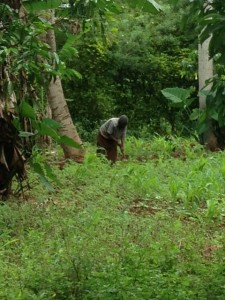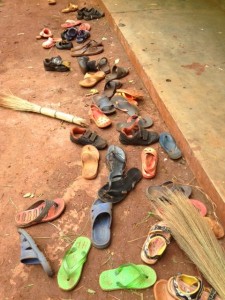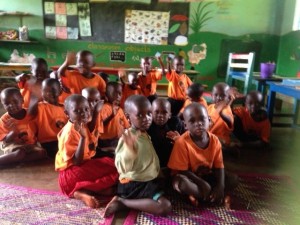

A Village Stroll
Our tour guide is Augustin. We spend over three hours with him, meeting his family, being shown around his garden where vegetables and fruit are grown in abundance, and then taking a stroll through the local village to see life as it happens in rural Uganda.
We are I’m Jinja, three hours east of Kampala, and Augustin tells us that the village of 2,800 people has emerged over the last twenty years as activities on Lake Victoria and the adjoining river Nile, have grown in popularity. His family home accommodates his mother and grandmother, two unmarried sisters, his own wife and four children, and an apparent plethora of cousins and their children. The buildings are rough and ready: a timber frame, plastered in mud, and finished with a layer of ‘cow shit’ because this gives a smooth finish which is impossible with the red soil of the area. The garden feels far from rough and ready.
There are maybe four acres of agricultural land on Augustins’ homestead and by the end of our tour, we are bewildered by the range and quantity of produce: yams; pumpkin; peas; avocados; jack fruit; banana; sweet potatoe; okra; sesame; herbs of all sorts and many vegetables we’ve never heard of. Everything looks healthy and lush and trees are literally laden down with their fruits.
We are encouraged to taste and test everything and the experience puts the whole farm to fork concept in a new dimension. 70% of Ugandans, we are told, don’t own a fridge. They don’t need to because they simply go out and pick what they want to eat from the ground or bush or tree.
We are getting ready to move on from our horticultural lesson but have a last visit to see the two pigs in a pen. Pigs, we are told, are very special in Uganda. A primarily Muslim country, pork isn’t sold in many places, so it’s a speciality in those places where it is available. The pigs poke their heads out of the pen snuffling and snorting at us, and Claire and I get ready for a photo when a loud scream has us all jumping with fright. Frantically trying to find the source of the noise, I swing around, just in time to see something being flung at Ciaran and then to see Miriam jumping, hopping, lepping around the place and roaring at the top of her head.
It would appear she’s been bitten.
Claire and I nod to one another, realising our photo opportunity has been missed and we attempt to convey our apologies to the pigs. It’s hard to concentrate though, what with all the noise and the continuing hopping and jumping.
‘My foot’ she screams. ‘Ciaran, sort it out. Fix it!’
As we wander over to where she had been standing when the current tragedy hit, we see a massive ant hill, it’s inhabitants clearly upset and bewildered. All these acres of grounds, and all the paths and solid soil, and she manages to find an ant hill to stand on!
Eventually we have flicked away every last pesky ant, assured Miriam that her sandal is safe to retrieve and held her as she hobbled through the garden so that we can continue our walk. We inspect her foot and, with some difficulty, are able to identify a couple of small red dots where the damage was done. I hope her insurance covers all far flung eventualities!
It doesn’t take long for us all to forget this terrible incident, (although I suspect some will remember it longer than others!) and Augustin brings us to the heart of the village. We observe people cooking, chopping, washing, sleeping; children playing; hens cackling; goats bleating; men playing cards; women braiding hair; and not infrequently, the results of someone having been smoking a spliff or two!
The afternoon is warm but a pleasant breeze and regular cloud prevents it feeling oppressive. Some people we meet are shy, some welcoming, others unsure. Children giggle and congregate around us, with eyes full of wonder and excitement when Ciaran shows them their images on his camera.
A recurring phrase quickly establishes itself amongst us as we walk through the hundreds of dwellings: ‘where is she?’
She (Miriam) is found by turns in someone’s garden; sitting in a porch; on the ground playing with a child; asking a woman how she does her dread locks; looking at flowers with someone’s child on her hip; checking out what’s cooking in the pot of someone’s house. (yes, she actually went in and lifted the lid!).
Augustin is amused but also anxious to keep us together. Mir is oblivious, and would have brought half the children home with her, had she been asked.
Despite the relatively large number of people in this small area, and the absence of any privacy between them given the structure and materials of the houses, it’s surprisingly quiet. We still hear the monkeys and a very occasional radio (reggae) until Claire stops us. ‘Listen’ she whispers. And so we do. And there it is, the ‘universal sound’ of children playing. We are near the school.
There is no free education in Uganda but Augustin explains that this early years service is funded by an NGO, and enables all the children in the village to attend from ages three to six, at no cost to their parents. About half the children continue their education and attend primary school, at a significant cost: about $150 per term, which is massive money for people who earn so little.
The children sing for us and welcome us, and then we are required to sing for them. We all look blankly at each other, until one of the American Volounteers tells me the children know ‘head, shoulders,knees and toes’. I like to think it was a sparkling rendition.
The tour is coming to an end and we head back to Augustin’s house where the plan is for us to have lunch with him. When we called earlier, lunch was being prepared, and amongst the vegetables being chopped and steamed was a massive fish which we observed being cut into large slices. For what? and for whom? We shuddered to think. Now that lunchtime has arrived, we are getting nervous and quesy and start trying to think of excuses to avoid the ordeal of pushing the fish around a plate. We even justify it by saying it would be a waste for them to dish up food we won’t eat. Miriam rightly reminds us how insulting it would be not to sit down with them and so we prepare ourselves for the task of surripticiously hiding uneaten food. But then the dishes start arriving: sweet potatoe; steamed spinach with herbs; cabbage and onions; beans cooked in sauce; and the roasted banana which Miriam has told us about, along with the local peanut sauce. It is delicious. We tentatively taste to start with, but are quickly wolfing it down, and pretty much clear the plates. We simultaneously swallow our shame at having wanted to avoid this wonderful meal.







Leave a Reply